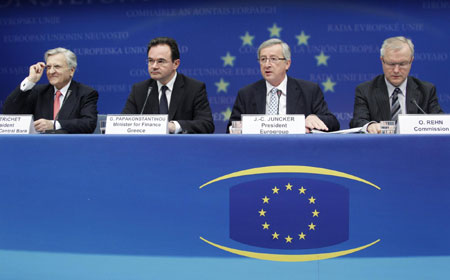Global Biz
Eurozone finmins activate aid package for Greece
(Xinhua)
Updated: 2010-05-03 14:43
 |
Large Medium Small |
BRUSSELS - Eurozone finance ministers agreed on Sunday to activate the aid package for Greece, offering along with the International Monetary Fund (IMF) 110 billion euros to the debt-laden country in the next three years.
|
 (From L-R) European Central Bank (ECB) President Jean-Claude Trichet, Greek Finance Minister George Papaconstantinou, Luxembourg's Prime Minister and Eurogroup chairman Jean-Claude Juncker and European Union Economic and Monetary Affairs Commissioner Olli Rehn address a joint news conference after an eurozone finance ministers meeting on Greece at the EU Council in Brussels May 2, 2010. [Agencies] |
"Following a request by the Greek authorities, euro area ministers unanimously agreed today to activate stability support to Greece via bilateral loans centrally pooled by the European Commission under the conditions set out in their statement of April 11," President of the Eurogroup Jean-Claude Juncker told a press conference after a meeting of the finance ministers of the 16-member bloc that shares the single currency euro.
| ||||
The president stressed that the financial support will be provided under strong policy conditionality, on the basis of a program which has been negotiated with the Greek authorities by the Commission and the IMF, in liaison with the European Central Bank (ECB).
According to Juncker, the main elements of policy conditionality will be included in a council decision to be formally adopted in the coming days and further detailed in a memorandum of understanding to be concluded between Greece and the European Commission on behalf of euro area member states.
Juncker said the first disburdenment will be made available before the payment obligations of the Greek government fall due on May 19.
He said that parliamentary approval, needed in some member states prior to the release of the first tranche of the money, is expected to follow swiftly.
After the eurozone finance ministers agreed to activate the aid package for Greece, President of the European Council Herman Van Rompuy said in a statement that he will convene a meeting of the heads of state and government of the euro area on May 7, to conclude the whole process and "to draw the first conclusions of this crisis for governance of the Euro area."
He welcomed the agreement reached by the finance ministers of the Eurogroup on the adjustment program that was negotiated by the European Commission, the ECB and the IMF with the Greek government.
"I'm convinced that this sound and ambitious program will enable Greece to put right its economic and financial situation as well as its competitiveness," Van Rompuy said.
The finance ministers of the eurozone called Sunday's meeting after the Greek government announced earlier in the morning that it had reached a deal with the European Commission, the ECB and the IMF on the long-expected aid plan, which would oblige Athens to implement new harsh austerity measures and structural reform in the next three years.
"We have built the support mechanism out of nothing," Greek Prime Minister George Papandreou told a televised cabinet meeting. "A few days ago we asked for its activation and today we ratify the agreement. It is an unprecedented support package for an unprecedented effort by the Greek people."
Greek Finance Minister George Papaconstantinou later said the austerity measures, including cuts to civil servants' salaries and pensions, higher value-added taxes and retirement age, would save as much as 30 billion euros ($40 billion) through 2012 and help the country reduce budget deficit to below 3 percent of gross domestic product (GDP) by 2014 from the current 13.6 percent.
Papaconstantinou stressed that the measures, though difficult for his countrymen to swallow, were necessary for the country to avoid collapse.
Following the Greek government's announcement, European Commission President Jose Manuel Barroso urged eurozone countries to activate the rescue package.
"The Commission considers that the conditions for responding positively to the request by the Greek Government are met and recommends that the coordinated European mechanism for assistance to Greece be activated, on the basis of the agreed multi-annual adjustment program," he said.
"This assistance will be decisive to help Greece bring its economy back on track and preserve the stability of the euro area," he added.










